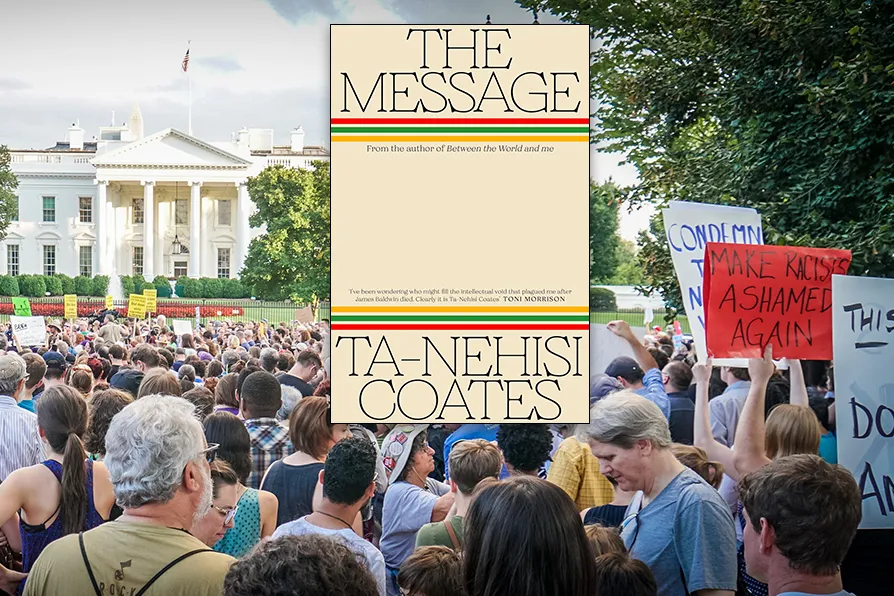Releases from Rahsaan Roland Kirk, Maggie Nicols/Robert Mitchell/Alya Al Sultani, and Gordon Beck Trio and Quintet
HENRY BELL welcomes a fine demonstration of the need to love the words themselves in the communication of political messages

 Candlelight Vigil at the White House, Washington, DC US, August 13 2017, counter-protesting the far-right rally the previous day at Charlottesville during Trump’s first term [Pic: Ted Eytan/CC]
Candlelight Vigil at the White House, Washington, DC US, August 13 2017, counter-protesting the far-right rally the previous day at Charlottesville during Trump’s first term [Pic: Ted Eytan/CC]
The Message
Ta-Nehisi Coates, Hamish Hamilton, £11.99
IN many ways the genocide in Gaza has been a rubicon: it has seen European fascism — because that is what Israel is an expression of — once again make real its threats of total dehumanisation. It has also shattered the myth of a liberal “rules-based” international order and made plain the imperialist reality of international relations and its toothless and one-sided “international law.”
This latest defeat for liberal self-delusion has created an artistic and intellectual shift. Voices — however erudite or impressive — that fail to speak out against genocide lose all credibility. The chorus of “I condemn Hamas” has left many once-respected literary or political figures naked in front of a younger generation that see the reality of Israeli terror on their phones each morning over coffee.
Such a breach necessarily creates new figures of moral and intellectual authority and Ta-Nehisi Coates perhaps represents that more than anyone.
Coates is a journalist, author and teacher from Baltimore, his work has often dealt with the political and emotional inheritance of black America, and with white-supremacy more broadly. On the cover of his latest book, Toni Morrison declares him the heir to James Baldwin.
In the opening pages he discusses the will to write; to be possessed, and even haunted by language. He lays plain his position that rhythm, sound, style and narrative matter. That, taken together, they can be used to confront and undo violence. A central tenet of the book is that the journalist has the power to redeem humanity, and it is not a coincidence that this person is also the martyr-hero of the Gazan genocide. The task of the young writer is to save the world.
There is no question that Coates is a master of style. He is a writer that loves the shape and sound of words and uses that love to communicate, and to illuminate, our shared humanity. This is language as an antidote to fascism. His prose is taut, thrilling, deliberate, and above all clear. One has the feeling of being in a great workshop, in which we are able to see all the moving parts, all the skilled workers, producing the object: The Message.
The book travels from the library of his Black Panther father, to the streets of Baltimore, to Harvard, to Senegal, South Carolina and Palestine. Everywhere Coates encounters the same violence: that of expropriation, division and plunder. Everywhere he encounters the same truth of resistance, and the possibility to make things whole again. The vital importance of the shared voices and wisdom of the people.
Coates highlights that the violence of the colonialist also relies on its own stories: “Even plunderers are human beings whose violent ambition must contend with the guilt that gnaws at them when they meet the eyes of their victims. And so a story must be told.”
In The Message the author is set on demolishing stories of supremacism and enforcing stories of liberation and reparation instead. When he runs his hand through the waves on Africa’s Atlantic coast and channels the dreams of his “exponential grandmothers taken from this side of the world and into the vast ocean” the effect is electric. Something is shown to us, a truth that – as Coates would say – haunts us.
The Message is a deeply personal intervention in the world, filled with conviction, learning and humility. It is not afraid of its own hopes and fears. Nor should it be. It is a hymn to the power of writing and of humanity; an important message to the messengers.

JOHN GREEN welcomes a remarkable study of Mozambique’s most renowned contemporary artist

MOLLY DHLAMINI welcomes a Pan-Africanist and Marxist manifesto that charts a path for Africa’s resurgence

A novel by Argentinian Jorge Consiglio, a personal dictionary by Uruguayan Ida Vitale, and poetry by Mexican Homero Aridjis

A beautifully-crafted documentary from Sinéad O’Shea










